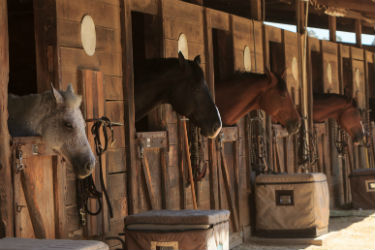Veterinarian Tips to Clear a Horse Barn of Flies

Flies can be a pain! House flies, blow flies, horn flies, stable flies, horse flies, it doesn’t matter the type; these pests seem to survive only to annoy, irritate and agitate a horse. Getting rid of them requires constant work and effort!
Veterinarian Tips for Clearing A Barn of Flies
Tip #1. Keep it dry!
Insects like wet, moist areas, and find these conditions perfect for breeding, eating, and drinking. Advise clients to check inside, as well as walk around the barn, and look for areas that offer the types of conditions where insects thrive, such as:
- Dirty stables with layers of wet straw or shavings
- Low pastures with standing water
- Old feeders that are no longer being used but hold rain water
- Poor drainage conditions surrounding the barn and pastures
- Plumbing issues
- Stalls with buckets holding dirty, stagnant water.
Tip #2. Keep it clean!
Horses poop and in large quantities! A large part of the time spent owning a horse involves cleaning up after it. If there isn’t a plan in place that establishes a routine for the management and removal of its manure, insects will quickly become a problem. Offer clients the following advice:
- When cleaning stalls, don’t just add new bedding. Stalls, pens, and other animal-holding areas need to be cleaned daily
- Remove dirty bedding from the barn promptly
- If possible, dedicate a site away from the barn for holding and piling manure until it can be removed
- Treat the pile to fight insect growth if the manure can’t be removed promptly.
Tip #3. Provide a breeze!
Insects maneuver better when the air is calm and still, and any amount of wind will help to keep them off an animal.
Stalled animals can be helped by placing large fans in the barn, aiming them in the horse’s direction. Pastured animals will get relief by being outside in natural breeze conditions.
Tip #4. Contain the feed!
Horse feed often has a sweet smell that draws insects to it. To keep bugs out, place grain in containers with tightly covered or airtight lids. Also remember to promptly dispose of any garbage or trash that could attract insects.
Tip #5. Turn off the lights!
Some insects prefer light. Providing animals with shade during the day and turning off barn lights, will eliminate the environment that certain insects inhabit, as well as reduce other types of insects that are attracted to light.
Tip #6. Apply barn management!
When flies continue to be a problem, the following types of fly control may need to be considered:
Topical Insect Repellents
Flies are attracted to the scent of horse’s sweat and blood. Applying a topical helps to establish a vapor barrier that works as an insect repellent. Topical insect repellents can be purchased in the following application forms:
- Roll-ons
- Gels
- Sprays
- Shampoos
Both natural and synthetic insecticides will work. Topical insect repellents are affordable, carried in most farm supply stores, and are convenient to use and easy to apply. Their effectiveness is short-lived, so they may need to be reapplied daily, every few days or bi-weekly.
Fly Traps
There are many different methods that can be used to eradicate adult flies. Fly traps can be placed just about anywhere, but advise clients to take care to place them up and out of the way of the reach of animals. They will need to be replaced and disposed of as they fill with dead insects. However, they are relatively inexpensive and can be found in most farm supply stores.
Feed Additives
Clients interested in the use of feed additives as insect preventives may find the following information beneficial. Feed additives:
- Are supplied to the animal through its daily grain ration
- Require animals be fed individually to ensure they receive the proper dosage
- Are recommended for use through the spring and fall seasons
- Help to eliminate the development of the larval and pupal stages, but will not kill existing adult flies
- Work best when used with other types of fly control methods.
Keeping a barn free of flies can be a lot of work, but it’s an important chore to keep up with. Flies don’t only bite and pester, but can also spread disease.
At Covetrus, we believe the more information veterinarians provide clients, the more likely your clients will return. Here’s some additional information that may be of interest to your clients who have horses:
Leptospirosis in Horses
Equine West Nile Virus
Equine Deworming Strategies
Talk to your Covetrus representative for suggestions on additional methods for providing care to stabled horses. Contact us online or at 855.724.3461.
Sources:https://horseandrider.com/advice/defeat_the_enemy_042509-13034
Careers
Are you looking for a place to let your talents shine? At Covetrus, we help our practitioner customers better serve their patients and take pride in providing the best customer experience possible. Search our open positions to see our available opportunities.
Newsletter
Stay current with what’s going on with Covetrus, subscribe to receive our newsletter and email communications. Subscribers will receive the latest information in practice management, sales and marketing, animal health, and more.


Leave a comment